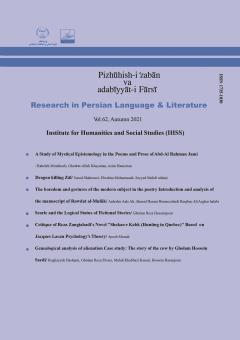The boredom and gestures of the modern subject in the poetry Introduction and analysis of the manuscript of Rawdat al-Mulûk
Subject Areas : Research in Iranian classical literatureardeshir aleali 1 , Ahmad hasani hormozabadi ranjbar 2 * , aliasqar HALABI 3
1 - PhD student in Persian language and literature (Islamic Azad University, Central Tehran Branch. Tehran, Iran.
2 - Professor, Islamic Azad University, Central Tehran Branch. Tehran, Iran.
3 - Assistant Professor, Department of Persian Language and Literature, Central Tehran Branch, Islamic Azad University, Tehran, Iran.
Keywords: Manuscript, Practical Philosophy, the Nasirean Ethics, Shi’a Literature, Rawdat al- Mulûk,
Abstract :
Rawdat al- Mulûk is a book belonging to the ninth century AH by an unknown author; it is a literary book on practical wisdom. The book, like most of other books on ethics written after Khajeh Nasir al-Din al-Tusi, is basically an imitation or adaptation of the Nasirean Ethics. The Shi’aauthor of the book knew literature and Arabic, and was interested in technical prose, and he intended to compile a book on ethics. Although, comparing other similar works, this book cannot be considered as prominent and distinguished, in writing this book, he has done his best and usedhis good taste. The book was written in the late Timuridera. Even though, authoring the books on ethics by Shi’a writers of that time has not been unprecedented, it can be considered one of the first, or perhaps the first known examples of the books on ethicswritten in literary form by Shi’a authors and presented to a Shia court. The book has been hidden for a long time since its completion, and the only well-known surviving manuscript of it was transcribed 160 years ago. Since for carrying out research in disciplines such as ethics and literature, we are required to review and critique all the old surviving works of these disciplines, the book needed to be critically edited. Considering that there is only a single edition of this manuscript, this was done by a scientific deductive method and using known sources of the text.
ابن اسفندیار، بهاءالدین محمّد (1366) تاریخ طبرستان، تصحیح عباس اقبال آشتیانی، تهران، پدیده خاور.
برزگر، اردشیر (1388) تاریخ تبرستان، تهران، رسانش.
دهستانی، حسین (1363) فرج بعد از شدّت، تصحیح اسماعیل حاکمی، تهران، اطلاعات.
روضةالملوک (نسخۀ خطی)، محفوظ در کتابخانۀ مرکزی و مرکز اسناد دانشگاه تهران (شمارۀ نسخه: 3520).
عبید زاکانی، نظام الدین (1387) اخلاق الاشراف، تصحیح علی اصغر حلبی، تهران، اساطیر.
طبرسی، ابوعلی فضل (1380) نثراللئالی، محمّدحسن زبری قاینی، مشهد، آستان قدس رضوی.
طوسی، نظام الملک (1369) اخلاق ناصری، تصحیح مجتبی مینوی، تهران، خوارزمی.
--------------- (1383) سیاست نامه (سیرالملوک)، به اهتمام هیوبرت دارک، تهران، علمی و فرهنگی.
عطّار نیشابوری، فریدالدین (1378) تذکرةالاولیاء، تصحیح محمّد استعلامی، تهران، زوّار.
عنصرالمعالی کیکاووس (1366) قابوس نامه، تصحیح غلامحسین یوسفی، تهران، علمی و فرهنگی.
عوفی، سدیدالدین محمّد (1397) جوامع الحکایات و لوامع الروایات، تصحیح امیربانو مصفّا (کریمی) تهران، پژوهشگاه علوم انسانی و مطالعات فرهنگی.
غزالی طوسی، محمّد (1351) نصیحةالملوک، تصحیح جلال الدین همایی، تهران، انجمن آثار ملی.
---------------- (1382) کیمیای سعادت، تصحیح حسین خدیوجم، تهران، علمی و فرهنگی.
نصرالله منشی (1391) کلیله و دمنه (ترجمه)، تصحیح مجتبی مینوی طهرانی، تهران، دانشگاه تهران.
وراوینی، سعدالدین (1380) مرزبان نامه، تصحیح خلیل خطیب رهبر، تهران، صفی علیشاه.
وطواط، رشیدالدین محمّد (1386) مطلوب کلّ طالب، تصحیح محمود عابدی، تهران، بنیاد نهجالبلاغه.

